
Chick-Fil-A
I want all my children to work fast food someday. Why would I subject the little darlings to low pay, hectic dinner rushes, rude customers, demeaning work, ignorant coworkers, monotonous tasks, slippery shoes, and stinky clothes?
The short answer: Life is filled with the above, so you might as well expose ’em while they’re young. The long answer: Much of what I learned in business I learned from fast food. Not the creative stuff. Not sustained rejection. Certainly not cerebral problem solving.
But working fast food taught me the essence of hard work—livelihood’s version of basic training. After two years as a low-level cooking, toilet cleaning, truck unloading, chicken suit wearing, stench absorbing, fry serving, drive-thru calling, and overly perspiring wage-worker at Chick-Fil-A, here’s what I learned about business, customer service, teamwork, and life: Continue reading…
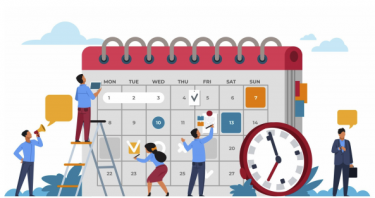 If you’re able to organize your life without a calendar, I have two things to say: 1) You are a miracle; and 2) The following does not apply to you.
If you’re able to organize your life without a calendar, I have two things to say: 1) You are a miracle; and 2) The following does not apply to you.
For everyone else, I have some proven advice that will help you get the most from your daily, weekly, monthly, and even annual schedule, while helping you free up precious time and prioritize things that are more important to you.
In no particular order, they are as follows:
Continue reading…
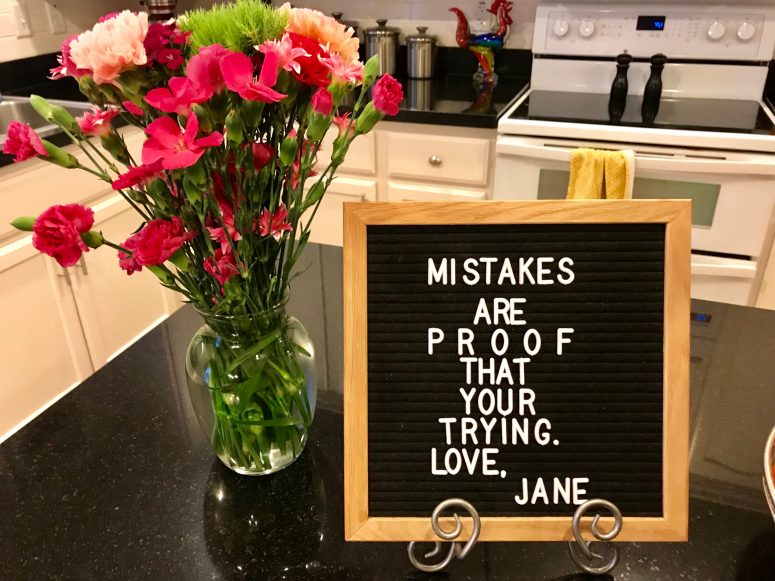
I made a boo-boo at work yesterday. The client I was working with was very understanding, forgiving, and even accepted some of the blame. But I felt pretty rotten about the oversight.
Now, I’m not a perfectionist because done is better than perfect. But I couldn’t shake my disappointment of letting them down. So much so that I continued to worry about my mistake into the night.
Then I awoke to the above new sign on display in our kitchen today, which was ironically crafted by my eight year old daughter. It immediately cheered me up. Partly because I learned some things from my mistake and instituted two immediate changes that will make me a better writer. But also because the sign reminded me that it’s okay to make mistakes.
Showing up really is half the battle. As my friend David says, “You gotta play some sour notes in order to make your sound sweeter.” I’m grateful of those simple truths that make improvement possible.
Thanks, Jane.
This story first published to blakesnow.com in 2018

Courtesy Shutterstock
Once upon a time, I played adult fast-pitch baseball for several years in my late 20s. It was incredibly intimidating, since I played against several ex-major leaguers and college players. Some guys threw in the upper 80s, even, which is unnerving at best and scary as hell at worst!
Anyways, I started at right field, which baseball fans know is where you put the worst fielder. But I usually batted third, fourth, or fifth, which is where big hitters usually line up.
Only problem was, I wasn’t a big hitter. Why did my coach put me there?
Because I had one goal—get on base. What’s the easiest way to do that? Hit singles or walk. So that’s what I did.
I hit a lot of singles back then. Walked a lot too. I never swung for the fences and always made the pitcher work for three strikes, which is very hard hard to do at amateur levels, especially if the hitter isn’t swinging. So I only swung at strikes.
Halfway into the season, my teammate Russ pulled me aside and asked, “Have you looked at your online stats?”
“No,” I replied. As a rookie, I didn’t even know that was possible. “Well you’re leading the team in RBIs (runs batted in) and have an on-base percentage over 70%. NICE WORK!”
That praise and realization felt good. But it also reminded me of an important life lesson: thinking small often leads to big results. Since small ball is boring and unglamorous, however, not many people engage in it. Big ball, you see, gets most of the fame and attention.
Obviously, big ball works too. Maybe just as much, if not more, than small ball. But big ball is harder to pull off. It requires more skill and God-given talent. I’m often short on that.
So I in life, business, and baseball, I usually choose small ball.
PS—Small ball works in all aspects of life and sport, not just baseball. For example, Italy plays some of the smallest, most boring soccer you will ever see. But they are tied for second for most World Cups. Because small ball works.

“Which button lets me quickly clear the screen after I don’t leave a tip?”—New Yorker
The Associated Press reports, “As more businesses adopt digital payment methods, customers are automatically being prompted to leave a gratuity — many times as high as 30% — at places they normally wouldn’t. ‘The onus should absolutely be on the owners,’ one barista said. ‘But that doesn’t change overnight. And (tipping) is the best thing we have right now.'”
While I’m happy to tip for sit-down restaurants and drivers, I feel no guilt clicking “no tip” for counter service or other non-customary situations. If consumers stand their ground, underpaid employees will eventually bolt for better paying jobs, and underpaying owners will be forced to raise their wages.
Am I wrong?

Courtesy 20th Century Fox
$375 an hour is a lot of money. It was even more money 20 years ago when a bougie investment bank paid me that to share my honest opinion with some of its biggest customers.
Many people don’t know this, but I got my start in writing covering video games of all things. It was the ideal subject for an early twenty-something like me. I threw myself into the “work,” was one of the most prolific tech bloggers for AOL (aka America On-Line), and had a blast attended game conferences, interacting with readers, and crafting sentences for a living. It was a lot like Tom Hanks character from Big. I was getting paid to play with toys and critique commercial art.
The pay wasn’t great. But when paired with magazine freelancing, it was enough to support my small, apartment-living family. I’m smiling right now just thinking about it. Continue reading…

My daughter recently asked how someone gets rich. Before I share my answer, it’s important to distinguish rich from wealthy (and upper middle class).
Rich is having a high income, typically north of $300,000 a year in America, regardless of debt. Wealthy is possessing a large amount of money, property, assets, savings, and/or investments relative to debt (aka “high net worth”).
For reference, the lower economic class makes less than $50,000 a year; middle class between $50-150k, and upper middle class between $150-300k. Super rich (just 1% of Americans) make half a million a year or more.
Depending on how fast you spend money, it’s possible to be “rich but broke.” It’s also possible to become wealthy over time without ever being technically rich in any given year. And depending on your lifestyle, where you live, and your family status, it’s possible to live rich and/or approach wealth without hitting those exact numbers.
That said, there are five proven ways to make a lot of money. They are as follows: Continue reading…
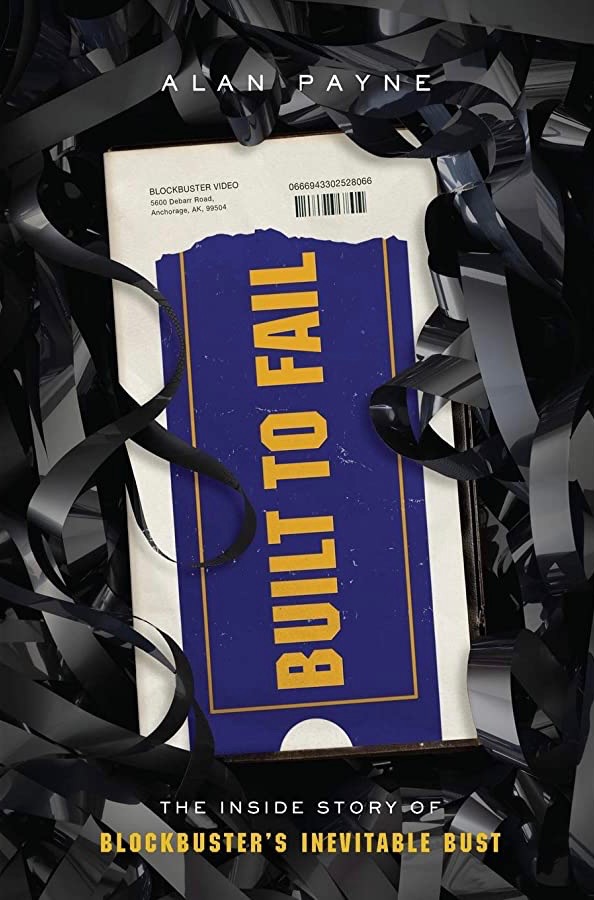
Insightful book by franchise owner Alan Payne that argues Netflix wasn’t the problem since Blockbuster was self-inflicting wounds a full decade before streaming took over. I enjoyed the book and suspect those who lived through it would too. ★★★★☆

Courtesy Shutterstock
I recently watched two documentaries that left me shrugging.
The first was a an hour-long report on the lack of truck drivers. Basically the filmmakers openly wondered about how to correct the truck driver shortage. They never acknowledged that everyone’s packages are still being delivered. And they offered no answers to the proposed problem, even the dead-simple one that capitalism is really good at solving (i.e. paying more) for talent shortages.
“This isn’t my and/or society’s problem,” I remarked to my wife afterwards. It’s Amazon’s, Walmart’s, and anyone else who heavily depends on shipping. Let them figure it out. With trillions of dollars at stake, they’re highly motivated to do so. No need to worry. Next!
The second documentary openly wondered about what to do about rising temperatures at our Southern Border, which are sadly killing a growing number of immigrants. While I appreciate the documentary’s concern, the filmmakers implied this was society’s problem to fix. And not by reversing climate change, mind you. Rather, the government should do something to help migrants withstand hotter temperatures as they sneak into America, the documentary asserted.
This too, left me shrugging. Maybe just put up signs warning people who exercise free will of the heightened temperature risks and call it a day? Or trust that migrants will increasingly make the attempt during cooler winter temperatures. They have brains too, ya know.
I don’t mean to be insensitive, but the level of distrust for the systems that are actually making the world a better place surprise me.
The world is getting better. Maybe not as fast as you like, but it’s getting better. And there’s no evidence to suggest that trusting in the system actually hinders progress.
You can have both trust and progress. The two aren’t mutually exclusive. In fact, humans are very good at building systems of trust that work more than they fail… while making progress. Trust in that.
Next!

Courtesy Warner Bros.
I’ve been writing full-time on a professional basis for almost two decades. In that time, I’ve written two books, hundreds or reports, and thousands of articles.
To publish that amount of work, I’ve also committed tens of thousands of mistakes. Maybe more. My last book alone contained thousands of errors after my editor bled all over it. On top of that, I was born with bad diction, and am subjected to nasty hate mail after some of my mistakes.
Why am I telling you this?
Because in both life and writing, mistakes are an everyday thing. In fact, the latter happen every minute. That’s because language and communication are incredibly complex, even for professionals like me who get paid to write fewer mistakes than you do. The sooner you accept, if not embrace, mistakes, the better writer you’ll be. Continue reading…

Courtesy Shutterstock
Short answer: Figure out what’s abnormally expensive, and then don’t buy that thing.
Long answer: Think creatively about how to still satisfy your wants and or needs in a different way. After the price of brisket recently skyrocketed, for instance, I slow-cooked a roast instead and it turned out pretty good! I’d say maybe 80% like real brisket and would eat it again. Plus, it was a lot more palatable to pay $15 for a hunk of BBQ instead of $55.
My wife and I do the same with travel. We try to book during low season when prices are less. This requires a flexible schedule or some additional sacrifices in time, but it’s a wonderful way to save on airfare, hotels, and tours.
In short, you gotta follow the “SUCC” framework if you wanna beat inflation:
- Substitute items or experiences (like roast for brisket or off-peak travel)
- Use existing resources in new ways (like credit card cash back points for new home decor)
- Conserve the little things that add up over time (cut out subscriptions that no longer delight you; these can add up quick and pay for things that still do)
- Coop with others around you to pool and or share resources (Not just Airbnb and Uber, but ask friends and neighbors if you can exchange or borrow things without imposing on their kindness)
Lastly, if you really love something and can still afford it, don’t overthink it. Just buy it.

What happens when two Hollywood actors who know nothing about soccer buy a middling pro team in Wales? GQ’s Tom Lamont spent a season following football’s newest fans to find out. “Maybe we don’t make it all the way to the Premier League,” Reynolds allowed, “but if this club is promoted, once, twice, that’s epic, right? That’s history.” Continue reading…

Courtesy New Yorker
I “sold” religion door-to-door in Brazil two decades ago and I know it annoyed a lot of people. But this fantastic long-read on for-profit door-to-door salesmen makes me feel slimy because these guys are a nuisance and largely dishonest. The problem with door-to-door product sales is that many (most?) harbor the dishonest believe that every household needs what they’re selling. That’s just not true. But because of the rise of spam lists and not call registers, door-to-door sales are actually growing. Hustle always works. And so does taking advantage of mentally feeble buyers.

Courtesy Warner Bros.
Yesterday at my kids’ soccer tryouts, I overheard two young mothers discussing husband careers. Apparently one of them is starting a company that’s “building a rock climbing app in the metaverse.”
I smiled at the naivete. The metaverse isn’t real. It’s entertaining science fiction that recently became a buzzword to sell exaggerated internet developments.
It’s the emperor’s new clothes all over again—a modern Second Life. Remember that old hype?
To be clear, I’m all for building new things—even “pipe dreams” like shipping east coast water to west coast droughts. But substantial things are honestly described and easily understood every time.
Otherwise you’re discussing something that isn’t real.

This is a fascinating long-read by Madeleine Aggeler: “The Liver King does own shirts, first of all. Several, he claims. I haven’t personally seen them, because when he greeted me in the cavernous entryway of his Texas mansion, he wasn’t wearing one. Nor did I see any in his closet later, which—though it contains approximately 900 identical pairs of athletic shorts and enough guns and ammunition to arm the military of a smaller nation—did not seem to contain even a single t-shirt. Nonetheless, he assured me that there are a few in there, somewhere. It was a bit like when a sign at a national park tells you there are mountain lions in the woods: You believe it, but you understand that you’re unlikely to cross paths with any.” Continue reading…
 It’s not as iconic, big, or as juicy as Shoe Dog, but Authentic: A Memoir of Vans by Paul Van Doren is a straightforward, if not understated, perspective on business success. Just like the shoes themselves. I enjoyed this quick read and threw it in the growing pile of inspiring American success stories.
It’s not as iconic, big, or as juicy as Shoe Dog, but Authentic: A Memoir of Vans by Paul Van Doren is a straightforward, if not understated, perspective on business success. Just like the shoes themselves. I enjoyed this quick read and threw it in the growing pile of inspiring American success stories.
Rating: ★★★☆☆. These were some of my favorite passages:
- Hard work, honesty, and caring for people are what yield success. The beauty lies in simplicity, so don’t overcomplicate things.
- My belief is that you can always teach people how to do things. What you cannot teach people is how to understand other people.
- My experiment proved that we did indeed have a serious quality control problem: the people in charge of quality control had no idea what they were looking at.
- When I started interviewing people for jobs with us, the first thing I would do after someone handed me his or her résumé was toss it in the trash. They would be horrified, of course, and get nervous, but when I proceeded to ask questions and have them tell me about themselves in their own words, they relaxed. How else could I find out who they really were?
- We can all recognize that we need one another. I said it at the outset of this book, and I’ll say it again: no one gets anywhere alone.
- Opportunity is missed by most people because it is dressed in overalls and looks like work.
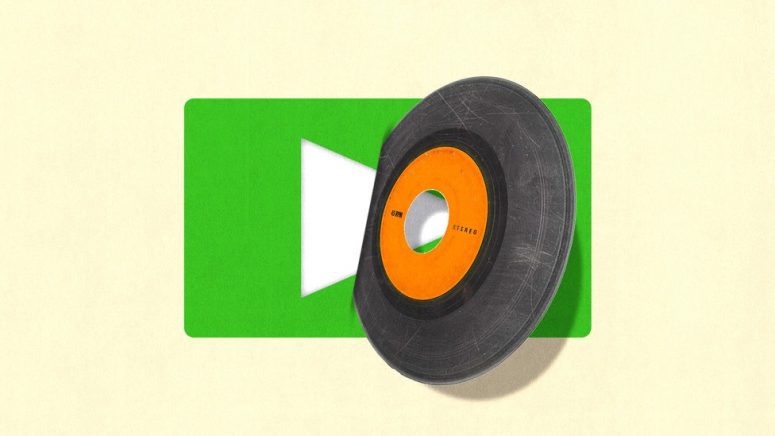
The Atlantic reports: “Old songs now represent 70 percent of the U.S. music market. Even worse: The new-music market is actually shrinking. The problem isn’t a lack of good new music. It’s an institutional failure to discover and nurture it… The moguls have lost their faith in the redemptive and life-changing power of new music.” Continue reading…
 It’s not rocket science. To get the most of your day, we must do the following:
It’s not rocket science. To get the most of your day, we must do the following:
- Live by a daily prioritized calendar.
- Surround yourself with positive people by shunning toxic ones and resolving tensions directly.
- Break large tasks into smaller chunks (i.e. write chapters not books).
- Do work you can be proud of while limiting distractions (i.e. email, social media, doomscrolling, mindless diversions)
- Celebrate successes and overcome challenges with positive thinking.
Those are the most fulfilling habits I’ve adopted over the years, many of which are featured in Caroline Webb’s helpful How to Have a Good Day.
Although Webb spent too much time rehashing Kahneman’s groundbreaking Thinking Fast and Slow, I appreciated her earnestness in helping others.
Her formatting was also a little blocky, but the message rings true: “Studies have found we can reap immediate intellectual and emotional dividend from investing in exercise and sleep, or even from taking a moment to breathe deeply, smile broadly, and stand a little taller.”
TL;DR: Attitude is everything.

My adorable daughter photographed by my devoted wife Lindsey
I love this fact-based, feel-good article by Ben Carlson: “Since 2008, we’ve experienced flash crashes, government shutdowns, natural disasters, trade wars, a contested presidential election, a pandemic, and the fastest bear market in history. Yet the Dow rose from 11,497 to more than 36,000 and counting. Maybe our best days are behind us. Maybe it will be impossible to see the same amount of growth going forward. It’s certainly possible. I choose to believe that most people will continue to wake up in the morning looking to improve their lot in life. People have been betting against the U.S. economy for decades. They’ve never been rewarded for it. Progress is in our DNA. Good luck betting against it.”

Shutterstock
According to Quora: “We all find ourselves in negotiations at some point in our lives. Raises, marital disputes, car shopping, you name it. I’d imagine that the Internet waited with bated breath for an answer to the Quora question, “What are the basics of the art of negotiation?”
“Thankfully, author, entrepreneur, and angel investor David S. Rose chimed in with his thoughts. Rose’s answer was concise and simple. Six points, really. Understand the market, understand your options, understand the other side’s options, decide on your walk-away outcome, decide on your ideal outcome, and negotiate with integrity.
“As a bonus, Rose notes that the critical aspect of negotiation is deciding on your walk-away outcome. Once you figure that out, the rest is easy.”
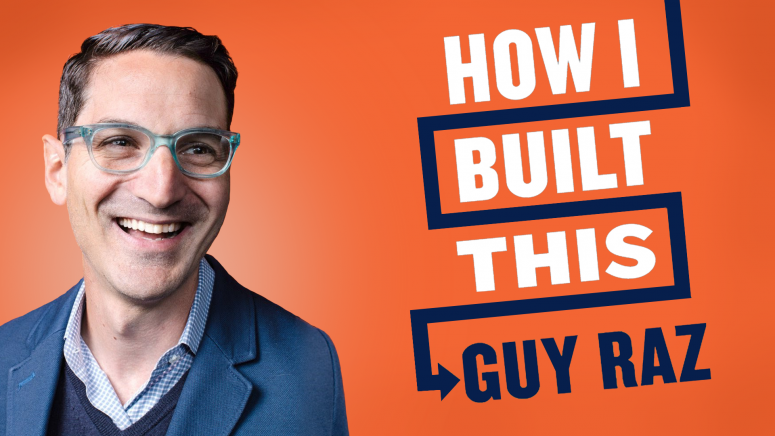
I recently binged on several dozen episodes of How I built this over a few long flights and a couple long nights. These are what I believe to be the most insightful, heartfelt, and inspiring stories:
- Jonah Peretti (new media mogul)
- Blake Mycoskie (three-time entrepreneur)
- Barbara Corcoran (real estate mogul)
- Sarah Blakely (corset underwear inventor)
- Jimmy Wales (encyclopedia savant)
- Jack Conte (artistic crowd-funder)
- Tony Hsieh (online shoe kingpin)
- Rick Steves (travel magnet)
- Vlad Tenev (Wall Street disrupter)
- Ben & Jerry (modern ice cream pioneers)
Honorable mention: Joe Gebbia (home share inventor)

Several years ago, I talked with my wife about working Monday–Thursday only if I could hit my income goal. This was incredible motivation. So much so that I hit my target some 8 months later.
For the next 18 months, I didn’t work a single Friday. Maybe an emergency email here and there, but never more than a few minutes. I didn’t check my inbox, make a call—nothing. It was professional and personal bliss.
My wife and I went on dates, played hooky that day, and spent more time with our children during “early release” Fridays. It was awesome.
Sadly, I got complacent and my income dropped. So I started working Fridays again to build it back up in recent years. Continue reading…

Last year in the middle of pandemic, my life-long friend, Wesley Lovvorn (pictured left) approached me (pictured right) about co-founding a company. I had been working from home for nearly two decades. He’d done so for almost a decade. Both of us had been self-help students for over 30 years. “Let’s combine the two and help the millions of employees now working from home,” he said.
After studying the market for several months, we discovered two things: 1) there wasn’t a dedicated company that did this, and 2) we possessed some promising experience, empathy, and research to make it happen. So we spent the next half year interviewing executives, speaking to mentors, developing the initial curriculum, branding ourselves as Power Space, and launching with two pilot customers last fall.
Since I come from a background as an explanatory writer-for-hire, I was dubbed “chief content officer” and tasked with producing the first year curriculum of 18 lessons. I also produce all of our marketing assets, such as press releases, content marketing, and websites that our outreach director (Hi, Abby!) then uses to spread the gospel. Since this is still a side hustle, I do all this in between my day job writing articles for Fortune 500 companies and fancy publications. Continue reading…

Watch this comical video to see what I mean. Not everyone talks like this, of course, but a lot of companies do.
For whatever reason (usually cultural ones), businesses like to speak in code to each other, and then they pay me to decode the nonsense into something actual humans can understand in written form.
It’s a confusing phenomenon, but I ain’t complaining. I love doing it.
See also: Why corporate speak is garbage language
My latest for Costco Connection (click to enlarge):
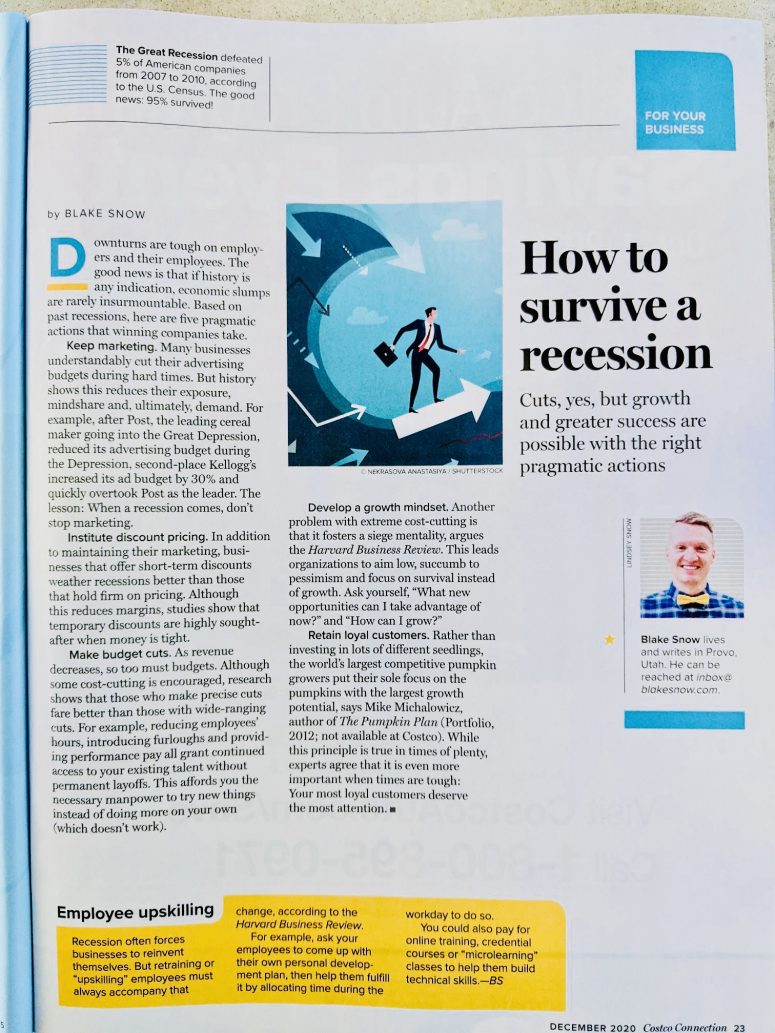
Thanks for reading.

Courtesy Shutterstock
Thanks for reading and sharing the ones that interest you the most:
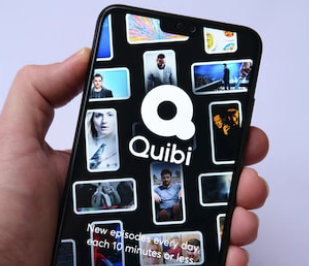
Courtesy Shutterstock
This is a great read by Bloomberg about the sudden rise and fall of Quibi, a short-lived streaming platform that threw a lot of money and hype at a problem that didn’t exist:
“By September, Quibi’s user base had crept to about 400,000, putting it far behind the company’s internal projections of 7.4 million viewers by the end of 2020. That same month, Whitman and Katzenberg considered raising more money or selling the company. They pitched Apple, Facebook, WarnerMedia, and NBCUniversal, none of whom bit on either option, according to people familiar with the meetings. With $350 million left, the co-founders abruptly decided to shut down the service.”
I remember hearing about the company when they launched this spring, thinking to myself “Who would pay $8 a month for 10-minute short movies?” and then I never heard from them again, until this news broke. It must be hard to get good feedback on new ideas when you’ve already found success like these two famous cofounders previously had.
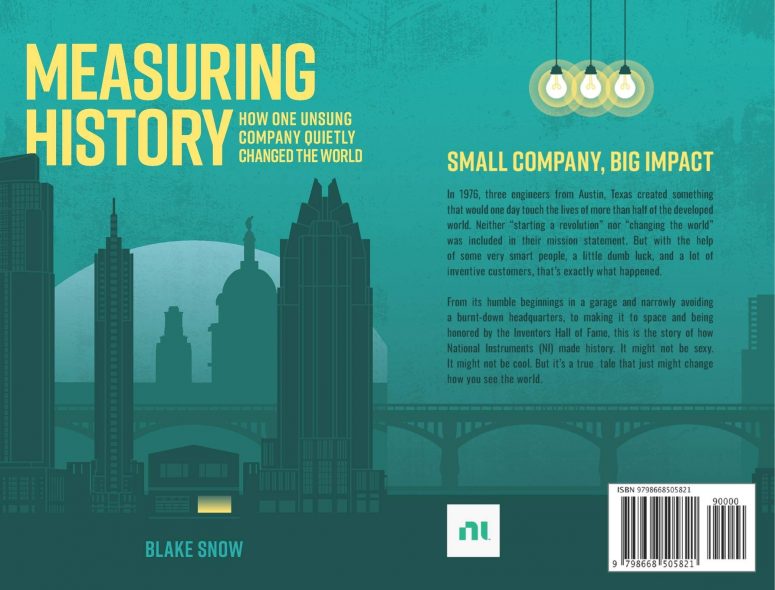
After more than a year of interviews, reporting, writing, editing, revisions, proofreading, and a couple of months of quarantine (hence the two month delay), I’m excited to announce the release of my second book, Measuring History: How One Unsung Company Quietly Changed The World. We were suppose to do a big book launch party in Texas but that was cancelled for COVID.
Nevertheless, I’m immensely proud of the result and look forward to celebrating and promoting the book over the next several months and into the new year. If you liked my first book, I hope you’ll consider reading this one about a special “little” company from Austin that changed the world in a big, albeit unseen way.
Book description here:
In 1976, three engineers from Austin, Texas created something that would one day touch the lives of more than half of the developed world. Neither “starting a revolution” nor “changing the world” was included in their mission statement. But with the help of some very smart people, a little dumb luck, and a lot of inventive customers, that’s exactly what happened.
From its humble beginnings in a garage and narrowly avoiding a burnt-down headquarters, to making it to space and being honored by the Inventors Hall of Fame, this is the story of how National Instruments (NI) made history. It might not be sexy. It might not be cool. But it’s a true tale that just might change how you see the world.
Thanks for considering it, reading, reviewing on Amazon, and forwarding to all your reader friends.
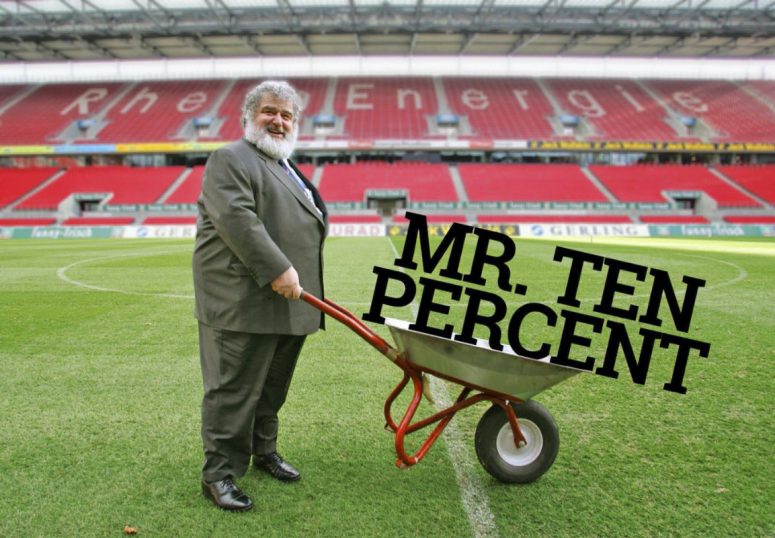
In 2015, the U.S. Department of Justice indicted dozens of global soccer officials on charges of rampant bribery, money laundering, and widespread corruption. As the “FIFA fallout” continues, here’s what organizations can do to keep themselves honest, in good standing with the law, and free from corporate fraud.
The month before the 2014 World Cup was set to kick-off in Brazil, a Los Angeles journalist by the name of Ken Bensinger received a juicy tip from a colleague. According to the tipster, a top U.S. soccer official by the name of Chuck Blazer had defrauded the sport of more than $20 million dollars. Not only did the official deal in the wholesale bribery, but he apportioned 10% of almost every single dollar that came in—even hot dog sales, even on charity games.
Bensinger did some digging, confirmed the rumors, and published his wild, investigative story for Buzzfeed News. The story went viral, and quickly uncovered a rabbit hole of obscene corruption that reached nearly every region of the global sport, from the bottom to the top. Although international FIFA officials were always suspected of rampant fraud, Bensinger’s story was the first to reveal that the culture of crime had undoubtedly reached U.S. shores.
A year later, with the help of a cooperating Blazer, the U.S. Department of Justice indicted the first of dozens of FIFA officials on organized crime charges of racketeering, bribery, money laundering, and fraud. That seismic event lead to Bensinger’s groundbreaking and riveting book, Red Card.
I recently spoke to Bensiger about the fallout and what companies can learn from the largest sporting scandal in world history. And although few, if any, legitimate businesses operate as organized crime syndicates like FIFA often did, Bensinger was quick to diffuse the proximity.
“It was organized crime, but the corruption case also involved several legitimate businesses,” Bensinger says. “Sports marketers, big broadcasters, and sponsors such as Coca-Cola, Sony, and McDonald’s, the latter two which even canceled their contracts with FIFA as a result.” Continue reading…
 My wife started and runs a successful soccer club of 14 youth teams. Now in their second year, they’ve done really well because they charge little more than recreational fees for a league that’s a lot more competitive, without the expensive time and money commitments of “club soccer.”
My wife started and runs a successful soccer club of 14 youth teams. Now in their second year, they’ve done really well because they charge little more than recreational fees for a league that’s a lot more competitive, without the expensive time and money commitments of “club soccer.”
After opening registration this summer, she had more than enough players sign up. That’s what you get when you run a well-organized event with lots of value. Last week, however, she received a long-winded email from a demanding mother that listed out several line items she required before registration. She went on and on, my wife said.
In response, my wife kindly but briefly wrote, “Thanks for asking. We’re full this year. Please consider us again.”
My wife instinctively understood that this woman might cause more headaches than her $200 registration fee was worth.
The same is true of any business. If someone seems like they’d be a difficult customer, they probably will be and should best be avoided through a polite “No thanks,” or “I’m busy.”
In rare cases where you provide a custom quote, you might try to “price them out,” that is only work with them for an amount that you estimate would be worth the added headaches.
Both approaches have served me well and really help the free market shine, for sellers as much as buyers.

Wikimedia Commons
PROVO, Ut. — Want to get ahead in this world? Work lots of extra hours — even nights and weekends — experts say, and it will all be worth your while.
“It’s easy to forget what’s most important in life,” says Bill Loney, a certified life coach who hasn’t quite made it in life yet. “Family, friends, and social activities that can often inspire and enrich the life of an individual… these are all distractions in getting more work done,” he adds.
Emma Royds, who hasn’t stopped looking at her smartphone every five minutes for three straight years, councils that most people actually die wishing they had spent more time — not less — working. “People never regret working too much,” she says. “My neighbor opted to do adventurous, social, and fitness-related activities with family and friends in his spare time.
“Now 80, he told me recently he really wishes he would have spent more time on TPS cover sheets, obsessively trying to turn his company into the next big thing, and reading email during every waking hour of his life. It’s kind of sad, really.” Continue reading…

Courtesy Shutterstock
What do the world’s greatest leaders have in common? What makes a great boss?
Stanford professor and management consultant Robert Sutton recently asked that question and presented his findings in an hour-long, information-packed lecture.
According to his research, this is what great leaders often do: Continue reading…
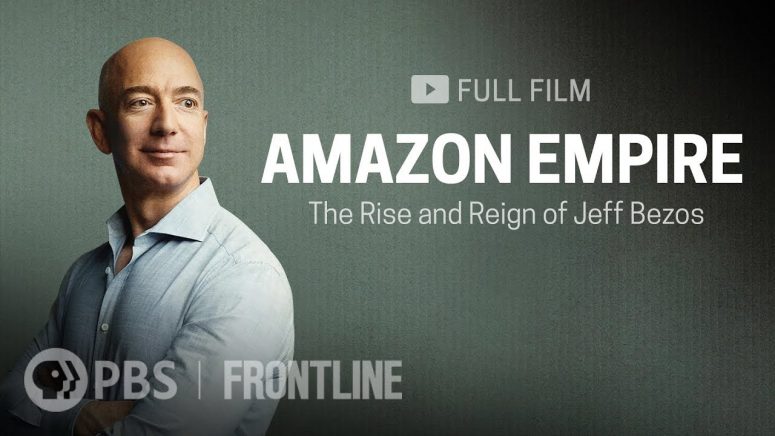
My wife and I (and even some of our young children) watched Amazon Empire: The Rise and Reign of Jeff Bezos recently. It’s a slick documentary that raises some important questions and concerns about the increasingly monopolistic company that keeps prices low (instead of raising them like past monopolies).
The movie wasn’t enough to make me ditch my Amazon Prime or Alexa accounts, especially given how much time and money Amazon has saved my family over the last two decades. That could change, but for now I’ll say: so far, so good. In fact, I’d rather convert to Android and stay with Amazon than stay with Apple and ditch Amazon—I like them that much.
For its slick production and warranted scrutiny, I award it ★★★★☆.
Fun fact: Walmart made twice as much money as Amazon did last year ($512 billion versus $233 billion).

This story by Molly Young on why corporations speak nonsense is the best thing I’ve read in a long-time:
But unlike garbage, which we contain in wastebaskets and landfills, the hideous nature of these words — their facility to warp and impede communication — is also their purpose. Garbage language permeates the ways we think of our jobs and shapes our identities as workers. It is obvious that the point is concealment; it is less obvious what so many of us are trying to hide.
I’m partially biased because I spend a lot of my time helping companies talk like humans instead of broken computers. And I suppose I might not have a job if humans always spoke clearly:
When we adopt words that connect us to a larger project — that simultaneously fold us into an institutional organism and insist on that institution’s worthiness — it is easier to pretend that our jobs are more interesting than they seem. Empowerment language is a self-marketing asset as much as anything else: a way of selling our jobs back to ourselves.
Either way, I think this is a must-read. I enjoyed every word—well, the non-garbage ones at least.

I was recently asked my approach to sales, given that I spend significant time asking people if I can write for them. Here it is in its entirety:
“Hi, human. I sell this thing for a living because I believe in it. It’s benefited myself and others like you. Are you the right person to pitch? If no, do you know someone who is? If yes, is now a good time?”
That’s it. This gentle but persistent approach has served me well, because it respects timing as much as finding and asking the right person.

Courtesy Outside Magazine
- What are borders for anyways?—There was a time when you had to commit a crime, or be suspected of committing one, to have your fingerprints and photograph taken by an officer of the state. Now all you need to do is take a trip.
- Examining illegal birth names—Some working-class names aren’t just looked down upon, they’re illegal. But these laws, which stretch from New Zealand to Tennessee, are often more about oppression than public decency.
- Why this bubble or eventual recession will be different—What we’re seeing today isn’t a dot-com bubble. If anything, it’s a not-com bubble—a period of inflated expectations for companies that had no business being valued like pure tech companies in the first place.
- What it’s like to eat meal replacement shakes for two years—Whether nutrient shakes are the food of the future, however, is up for debate. Julie Heseman, a principal at food service industry consulting firm Foodservice IP, thinks this type of product won’t take off for one reason: it’s just not tasty enough.
- Inside football’s campaign to save the game—Nationally, high school participation in 11-man football has fallen more than 10 percent since 2009. Here’s what the game is doing to attract athletes.
- “Kids these days” are actually better, even if you don’t understand them—Prediction: Today’s “OK boomer” Gen Z will complain about the youth one day. Blame human memory.
- Don’t be a jerk to your online humor editor—It should go without saying, but angrily replying to a rejection will get you nowhere.
- Chaos on top of the mountain—The story behind the viral photo and deathly May day on Mount Everest this year.
- Why a pop star walked across America—Years after he took that pill in Ibiza, Grammy nominee Mike Posner left behind his life in L.A. to go on a 2,851-mile journey in search of redemption, motivation, struggle, and triumph.

“I’m not mad at you,” she said. “I’m happy that you get the opportunity to make some money. I was blessed for a while. I hate to see it go. Now it’s your turn to be blessed.”—Shannon Mulcahy from Indiana after losing her job to an offshoring immigrant in a story published in the New York Times.

Me at my desk courtesy Lindsey Snow
I’ve been a professional writer since 2005 and a full-time writer since 2007. I moonlighted for a couple of years before transitioning to a full-time freelancing journalist, a “calling” I continue to this day.
Since then, these are some of the most frequently asked questions I get from aspiring writers or otherwise curious email inquires:
How do you become a self-employed writer?
My advice: write everyday and ask 50 people if they will publish your best work. If they all say no, ask 50 more and so on. This never fails but most writers will never do this and therefore go unpublished and unpaid. Usually I don’t even have to ask 50, but in two exceptional cases, I asked over 100 before someone said yes: My first story for Wired Magazine about college footballcomputers and my first travel column for Paste Magazine. Both were huge wins for my career and would have never happened had I quite after asking just 50. The harder you work, the luckier you get. (See also: How to succeed: Don’t quit until everyone in the room tells you “no”)
Is it actually possible to make a decent income at home and support a family by being self employed writer?
Yes. I’ve worked from home for the last 15 years, make a good income, and have six mouths to feed (wife and five children). In my experience, successful self employment requires persistence, low overhead (i.e. low maintenance lifestyle), extra emergency savings, and a willingness to sell your craft in addition to the craft itself. Self employment isn’t for everyone, but it can be done and is remarkably rewarding.
Continue reading…

Courtesy John Chau
I was recently moved by the following five long reads and hope you are too:

In short, it’s a terrific documentary on a charismatic con man, blind faith, broken promises, and a willingness to belong. 5 stars out of 5.

As a long-time tech journalist, I’ve noticed an interesting trend over the years. Companies who aren’t really tech companies will call themselves that anyway.
This is because “tech” is a lot like “new,” “free,” or “sale.” These words get people’s attention. So a lot of companies say they’re “tech” for the free publicity.
One such company is WeWork, a real-estate company that leases short and long-term office space stocked with free beer, cool lighting, and a community-for-hire for remote workers like myself. Continue reading…

Me hiking the Inca Trail
Here’s something you might not know about my work as a writer: 30-40% of my time is spent asking people if I can write for them, while the remaining 60-70% is spent on actually writing.
In other words, I’m either a writer who knows how to sell or a salesman who knows how to write. Consequently, I would’t have survived the past 15 years if I hadn’t asked thousands of people each year to let me write for them. I would have wilted long ago had I listened to the few rouge naysayers that rudely tell me to get lost sometimes.
Case in point: of the hundreds of emails I send on a monthly basis, the vast majority are ignored. Continue reading…
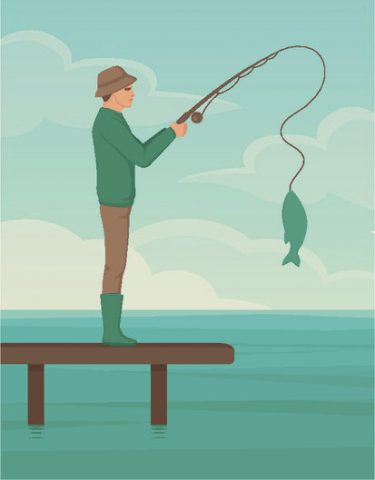 On a recent fishing trip with friends, in which we purposely neglected to pack in food, in order to make our catch really count, I went empty-handed after two full days of fishing. Thanks to my more-skilled-than-me buddies, who generously shared, I didn’t go hungry, however.
On a recent fishing trip with friends, in which we purposely neglected to pack in food, in order to make our catch really count, I went empty-handed after two full days of fishing. Thanks to my more-skilled-than-me buddies, who generously shared, I didn’t go hungry, however.
After serious bouts of self-doubt and nearly giving up on the third day, though, I decided I wasn’t going to quit until I caught at least one keeper. After empowering myself with that mindset, I actually ended up catching five that evening—enough to feed me and my friends, who coincidentally failed to catch one on that final day (really!).
On the return hike home, I thought a lot about dependency, perseverance and the power of determination—in life as much as business. Here’s what that experience taught me.
Continue reading…

Geoff Livingston
A businessman was standing at the pier of a small coastal village in Mexico. Just then, a skiff docked with one humble fisherman inside. His boat contained several large yellowfin tuna.
The businessman complimented the fisherman’s catch and asked how long it took to reel them in. “Only a little while,” the fisherman replied. The onlooker then asked why he didn’t stay out longer to catch more fish. The fisherman said he had enough to support his family’s needs. “What do you do with the rest of your time?” the man pressed.
“I sleep late, fish a little, play with my children, take siestas with my wife, stroll the village each evening, sip wine, and play guitar with my amigos,” the fisherman replied. “I live a full life, señor.” Continue reading…

Boulder, Utah

Courtesy Chicago Tribune
I read a thought-provoking story recently about Othea Loggan, a Chicago man who has bussed tables at the same restaurant for 54 years. He still works there today, earning just under $3 more per hour than minimum wage. With tips and annual bonuses, it’s estimated Loggan earns $14 an hour bussing the same tables he has for over five decades.
Unlike most entry-level bussers, Loggan gets five weeks vacation per year and works at a place he seems to really enjoy. Like every other busser, he gets no retirement or health insurance, however.
Despite all of this, Loggan (and his full-time working wife) raised a family, bought a house, and is seemingly happy, or at least he isn’t verbal about expressing any regrets. In fact, his son says as much. “My father is old school — never complains about nothing, never. My mother too. There were times it was hard to get food on the table, and they did not complain. But he got this job, he did it well, held on to it, and there needs to be a lot of respect for someone like that.”
The chef that has worked with Loggan for more than five decades says the same. “I think Loggan just decided to be a busboy. He is content. It’s all he wants. So I ask — isn’t that OK?”
It’s not okay, implies author Chris Borrelli. Continue reading…
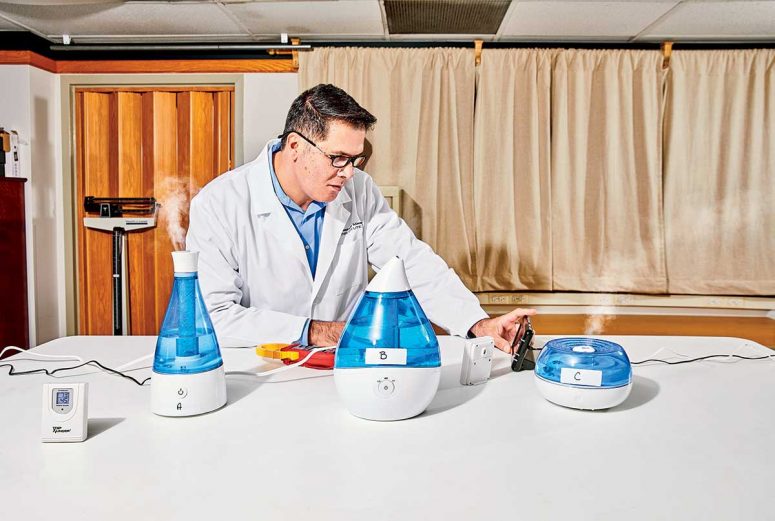
The writing, reporting, and humanity of the below four articles are absolutely excellent. Hope you enjoy them as much as I did:

Blake Snow
When it comes to increasing both your output and your impact, here’s how to work smarter instead of harder.
For Entrepreneur—If there’s one thing I learned while researching and writing my first book, Log Off: How to Stay Connected after Disconnecting, it’s how to get more done in less time.
For the first five years as a self-employed writer, I passionately and excitedly burned the midnight oil, thinking the act would get me ahead. While it certainly helped to cut my teeth and quicken my understanding of the craft, in hindsight I spent much of that time with my head down, spinning my wheels in the mud, and failing to see bigger ideas and opportunities.
That is until my “Montana Moment,” a life-changing and completely off-the-grid vacation in Big Sky Country that upended and improved my relationship to work in more ways than one. Since that fateful week, I’ve enjoyed record personal, professional, and social growth. But only because I radically changed my underlying approach and motivations for work.
There are as follows: Continue reading…

My answer: As I’ve said before, Emojis and animated gifs are not only appropriate in business emails, they often improve the response of work-related emails when used sparingly. I wouldn’t use them more than 25% of the time. But they’re downright endearing because business correspondence is often stuffy and staid. So the occasional visual surprise keeps things interesting and reminds the recipient that they’re dealing with a personable human being. I highly recommend them.

Courtesy MGM
If you’re reading this, I’m guessing you like money. What does money have to do with offline balance, though?
In my research, everything. Next to fame and sex—which by no coincidence are often facilitated by money—the latter is arguably the most sought after thing in life, particularly (but not exclusively) for male species.
For purposes of this newsletter, however, I won’t preach to you on the ill-guided focus of money or bottomless cup that is greed. Instead, I’ll let smarter people do it for me: Continue reading…


 If you’re able to organize your life without a calendar, I have two things to say: 1) You are a miracle; and 2) The following does not apply to you.
If you’re able to organize your life without a calendar, I have two things to say: 1) You are a miracle; and 2) The following does not apply to you.














 It’s not rocket science. To get the most of your day, we must do the following:
It’s not rocket science. To get the most of your day, we must do the following:























 On a recent fishing trip with friends, in which we purposely neglected to pack in food, in order to make our catch really count, I went empty-handed after two full days of fishing. Thanks to my more-skilled-than-me buddies, who generously shared, I didn’t go hungry, however.
On a recent fishing trip with friends, in which we purposely neglected to pack in food, in order to make our catch really count, I went empty-handed after two full days of fishing. Thanks to my more-skilled-than-me buddies, who generously shared, I didn’t go hungry, however.





